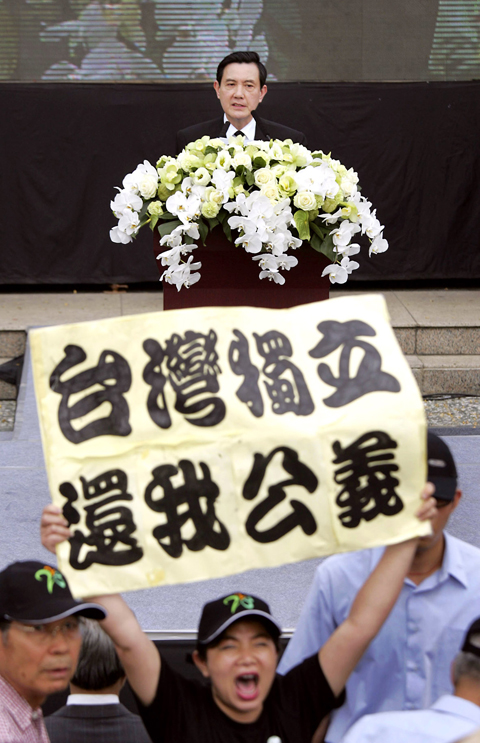Amid tight security and waves of protests, President Ma Ying-jeou (馬英九) attended the central memorial ceremony of the 228 Incident in Kaohsiung yesterday, pledging to seek ethnic reconciliation by finding the truth behind the incident.
Speaking in Hoklo (also known as Taiwanese) to address the ceremony held by the 228 Incident Memorial Foundation, Ma promised to listen to the voices of the 228 victims and their families with humility, unfreeze the budget for the 228 Memorial Foundation and continue to seek the truth for the sake of the families.
DISTURBANCE

PHOTO: AP
Several protesters stood up on their chairs in the seating area and unfurled protest banners that read “Formosa Independence” and chanted protest slogans while Ma was giving the speech. A group of protesters also shouted “Ma Ying-jeou, step down” outside the site.
Continuing his speech amid the loud protest, Ma said he understood the disapproval of some families of 228 victims and said he had been consistent with efforts to reveal the truth about the incident and see it through the eyes of the victims’ families.
“No apologies or compensation can bring back the lives of the victims ... The government should be compassionate because our power comes from the people, and we must listen to the people’s voices with humility,” Ma said at the ceremony held at the Kaohsiung Museum of History.
Ma pledged to defend democracy in Taiwan and promised to carry out his election campaign promise of establishing a national 228 Memorial Museum and supporting the operation of the 228 Memorial Foundation despite the legislature’s move to cancel its NT$300 million (US$8.6 million) budget this year. Ma said he would establish a regulation to push for the establishment of the museum and allocate an annual budget of NT$300 million to continue funding the foundation.
HISTORY
The 228 Incident refers to a massacre that began on Feb. 27, 1947, when Chinese Nationalist Party (KMT) troops suppressed an anti-government uprising, leaving tens of thousands dead, missing or imprisoned. The event was a precursor to the White Terror era in Taiwan.
Democratic Progressive Party Chairperson Tsai Ing-wen (蔡英文) also attended the ceremony, but did not interact with Ma.
APOLOGY
Chen Chin-huang (陳錦煌), the head of the foundation, later apologized for failing to prevent disturbances during the ceremony.
“We had planned to hold the ceremony in a peaceful and introspective atmosphere,” he said. “The protest disturbed the activity and was not respectful to the 228 victims.”
Ma encountered another smaller protest later in the afternoon while attending another 228 Incident memorial ceremony hosted by the Taipei City Government at the Taipei 228 Memorial Park. He ignored the protesting voices throughout the whole event.
“A priest told me that although I do not carry the original sin for the incident, I am responsible for finding out the truth ... I will focus all my efforts to look into the truth and give the justice that the families deserve,” Ma said.
The president later joined Taipei Mayor Hau Lung-bin (郝龍斌) and several members of victims’ families to untie a large white knot above the stage in a gesture of reconciliation among different groups. The guests, however, were unable to untie the knot, creating an awkward moment at the end of the ceremony.

CHAOS: Iranians took to the streets playing celebratory music after reports of Khamenei’s death on Saturday, while mourners also gathered in Tehran yesterday Iranian Supreme Leader Ayatollah Ali Khamenei was killed in a major attack on Iran launched by Israel and the US, throwing the future of the Islamic republic into doubt and raising the risk of regional instability. Iranian state television and the state-run IRNA news agency announced the 86-year-old’s death early yesterday. US President Donald Trump said it gave Iranians their “greatest chance” to “take back” their country. The announcements came after a joint US and Israeli aerial bombardment that targeted Iranian military and governmental sites. Trump said the “heavy and pinpoint bombing” would continue through the week or as long

TRUST: The KMT said it respected the US’ timing and considerations, and hoped it would continue to honor its commitments to helping Taiwan bolster its defenses and deterrence US President Donald Trump is delaying a multibillion-dollar arms sale to Taiwan to ensure his visit to Beijing is successful, a New York Times report said. The weapons sales package has stalled in the US Department of State, the report said, citing US officials it did not identify. The White House has told agencies not to push forward ahead of Trump’s meeting with Chinese President Xi Jinping (習近平), it said. The two last month held a phone call to discuss trade and geopolitical flashpoints ahead of the summit. Xi raised the Taiwan issue and urged the US to handle arms sales to

State-run CPC Corp, Taiwan (CPC, 台灣中油) yesterday said that it had confirmed on Saturday night with its liquefied natural gas (LNG) and crude oil suppliers that shipments are proceeding as scheduled and that domestic supplies remain unaffected. The CPC yesterday announced the gasoline and diesel prices will rise by NT$0.2 and NT$0.4 per liter, respectively, starting Monday, citing Middle East tensions and blizzards in the eastern United States. CPC also iterated it has been reducing the proportion of crude oil imports from the Middle East and diversifying its supply sources in the past few years in response to geopolitical risks, expanding

Pro-democracy media tycoon Jimmy Lai’s (黎智英) fraud conviction and prison sentence were yesterday overturned by a Hong Kong court, in a surprise legal decision that comes soon after Lai was jailed for 20 years on a separate national security charge. Judges Jeremy Poon (潘兆初), Anthea Pang (彭寶琴) and Derek Pang (彭偉昌) said in the judgement that they allowed the appeal from Lai, and another defendant in the case, to proceed, as a lower court judge had “erred.” “The Court of Appeal gave them leave to appeal against their conviction, allowed their appeals, quashed the convictions and set aside the sentences,” the judges